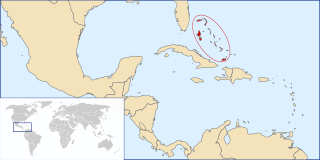
Before European colonization, the Turks and Caicos Islands were inhabited by Taíno and Lucayan peoples. The first recorded European sighting of the islands now known as the Turks and Caicos occurred in 1512. In the subsequent centuries, the islands were claimed by several European powers with the British Empire eventually gaining control. For many years the islands were governed indirectly through Bermuda, the Bahamas, and Jamaica. When the Bahamas gained independence in 1973, the islands received their own governor, and have remained a separate autonomous British Overseas Territory since. In August 2009, the United Kingdom suspended the Turks and Caicos Islands' self-government following allegations of ministerial corruption. Home rule was restored in the islands after the November 2012 elections.
The majority of the population of the Turks and Caicos Islands are Christian. They include Protestant 72.8%, Baptists 35.8%, Church of God 11.7%, Roman Catholics 11.4%, Anglicans 10%, Methodists 9.3%, Seventh-Day Adventists 6%, Jehovah's Witnesses 1.8%, and Other 14%
Drexel Wellington Gomez is a Bahamian Anglican bishop.

Arthur Dion "A. D." Hanna was a Bahamian politician who served as the eighth governor-general of the Bahamas from 2006 to 2010.

The Roman Catholic Archdiocese of Nassau is an archdiocese of the Latin Church of the Catholic Church in the Caribbean. The archdiocese encompasses the islands of the former British dependency of the Bahamas. The archbishop is the metropolitan responsible for the Diocese of Hamilton in Bermuda, which is a suffragan diocese, and the Mission sui iuris of Turks and Caicos, and is a member of the Antilles Episcopal Conference.
Sir Alfred Étienne Jérôme Dupuch, OBE, KSG was a Bahamian journalist and politician.
The Church in the Province of the West Indies is one of 40 member provinces in the worldwide Anglican Communion. The church comprises eight dioceses spread out over much of the West Indies area. The present position of Archbishop and Primate of the West Indies is held by the current bishop of Jamaica, Howard Gregory. Gregory was elected as the thirteenth Archbishop of the Province by clergy and laity attending the 40th Synod of the CPWI at the Cascadia Hotel, in Port of Spain, Trinidad in May 2019, succeeding John Holder who retired in 2018. Drexel Gomez was the primate before Bishop Holder until 2009. The church is also part of the Global South Fellowship of Anglican Churches.

Bahamians are people originating or having roots from The Commonwealth of The Bahamas. One can also become a Bahamian by acquiring citizenship.

The following is an alphabetical list of topics related to the Commonwealth of The Bahamas.
The Catholic Church in the Bahamas is part of the worldwide Catholic Church, under the spiritual leadership of the Pope in Rome. Columbus landed on one of the islands of the Bahamas in 1492 which he named San Salvador.

The Anglican Diocese of Jamaica and the Cayman Islands is a diocese of the Church in the Province of the West Indies. It was originally formed as the Diocese of Jamaica, within the Church of England, in 1824. At that time the diocese included the Bahamas and British Honduras ; in 1842, her jurisdiction was described as "Jamaica, British Honduras, the Bahamas". The Bahamas became a separate Diocese in 1861 and British Honduras in 1891. In 2001, the title of the Diocese of Jamaica was extended to include ‘and the Cayman Islands’ to recognise the growth of the Anglican Church in those islands, which had become part of the diocese of Jamaica in the 1960s.
The Bishop of Nassau was an episcopal title given to the Ordinary of the Anglican Diocese of Nassau, from its formation in 1861 until it was retitled the Diocese of Nassau and The Bahamas in 1942.
Henry Norris Churton was an Anglican colonial bishop in the 20th century.
Edward Townson Churton was an Anglican colonial bishop in the late 19th and early 20th centuries.
Spence Burton was an Anglican bishop in the mid 20th century and the first American to be consecrated a bishop in the Church of England.
Bernard Markham was an Anglican bishop in the 20th century.
Michael Hartley Eldon was an Anglican bishop in the 20th century.
Cornell Jerome Moss was the Bishop of Guyana from 8 December 2009 until his death.
Angela Palacious is a Bahamian minister of religion and author.
Dame Doris Sands Johnson was a Bahamian teacher, suffragette, and politician. She was the first Bahamian woman to contest an election in the Bahamas, the first female Senate appointee, and the first woman granted a leadership role in the Senate. Once in the legislature, she was the first woman to be made a government minister and then was elected as the first woman President of the Senate. She was the first woman to serve as Acting Governor General of the Bahamas, and was honored as Dame Commander of the Most Excellent Order of the British Empire by Queen Elizabeth II.







